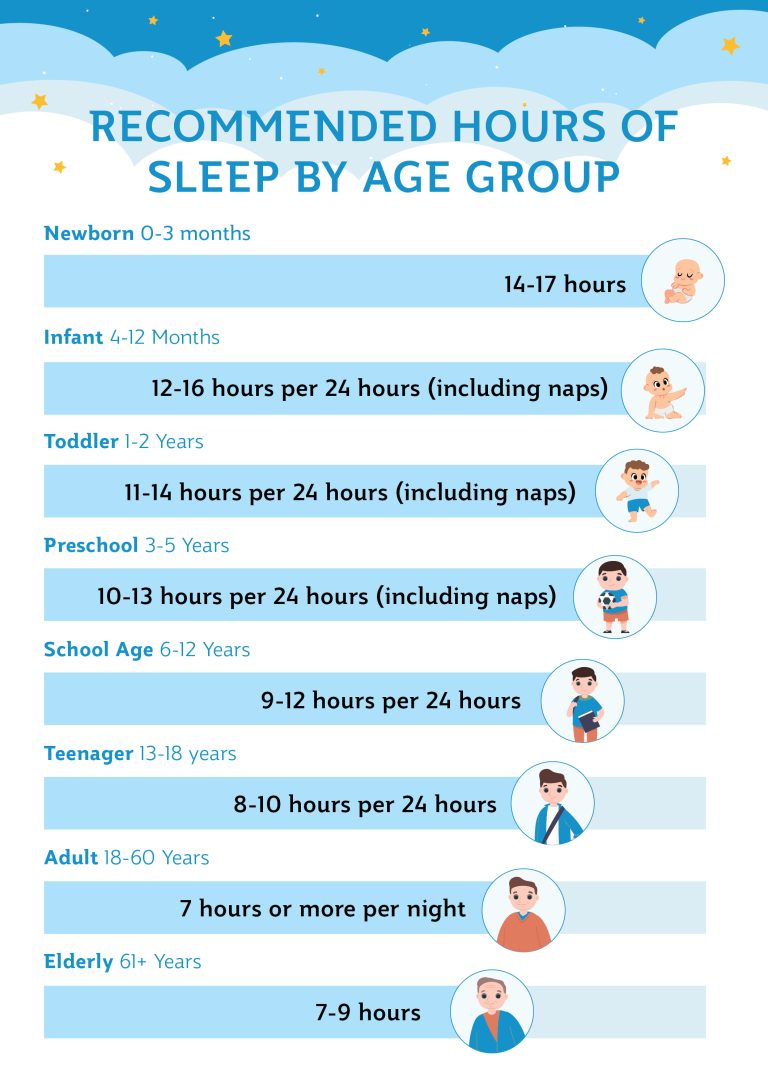
Are you getting enough sleep? We’ve all heard the old adage that we need 8 hours of sleep each night to function at our best, but is that really the magic number? The truth is, it’s not quite that simple. According to sleep experts, healthy adults generally require between 7 to 9 hours of sleep each night to achieve optimal physical and mental well-being. But here’s the catch: determining the right amount of sleep for you depends on various factors, including age, genetics, overall health, and lifestyle.
In this article, we’ll talk about how much sleep you need and some ways to determine if you’re meeting your sleep needs.
Sleep Hours By Age
It was previously mentioned that the minimum sleep time for adults is typically around 7 or more hours. However, the amount of sleep we require can vary depending on our age. The needs of children, teens, and seniors can be quite different. So whether you’re a parent trying to establish healthy sleep habits for your little ones or an older adult seeking to improve your rest, understanding the recommended sleep hours by age is key. Let’s take a closer look at the amount of sleep needed by age that can help guide us to better rest.

Other Factors That Can Affect an Adult's Sleep Requirements
While the recommended sleep hours by age provide a good starting point for determining how much sleep you need, several other factors can also affect your sleep requirements. Here are some factors to consider:
- Genetics: Research has shown that genetics play a role in how much sleep we need. Some people are natural “short sleepers” who can function well on just a few hours of sleep each night, while others may require more than the recommended amount.
- Lifestyle: Your lifestyle habits can also impact how much sleep you need. For example, if you’re physically active during the day, you may require more sleep at night to help your body recover. Similarly, if you consume caffeine or alcohol in the evening, it can interfere with your sleep and affect how much rest you need.
- Health conditions: Certain health conditions, such as sleep apnea, can affect the quality and duration of your sleep. If you have a medical condition that affects your sleep, you may require more sleep than the recommended amount.
- Age-related changes: Our sleep patterns and needs can change as we age. Older adults may experience more fragmented sleep, wake up more frequently during the night, and require more naps during the day.
- Stress and anxiety: Stressful situations can make it difficult to fall asleep and stay asleep, which can affect how much sleep you need. Additionally, anxiety and depression can interfere with your sleep and cause you to require more rest than usual.
By paying attention to these factors and prioritising your sleep health, you can ensure that you’re getting the rest you need to feel your best.
Ways To Determine If You're Getting Enough Sleep
After having a general idea about the ideal hours of sleep for your age and considering all the factors that influence your sleep needs, the next step is to assess yourself if you’re actually getting adequate sleep. Here are a few methods suggested by sleep scientists and physicians that can help determine if you’re meeting your sleep requirements.
- Use a Sleep Tracking Device: Wearables, bedside devices or bed sensors can be useful tools for tracking your sleep time and sleep patterns. Depending on the device used, they can provide information such as how long it takes for you to fall asleep, how many times you wake up during the night, and how much time you spend in different stages of sleep. This data can be helpful in identifying patterns and potential issues with your sleep. However, it’s important to keep in mind that sleep tracking devices are not perfect and may not always accurately reflect your sleep experience. So, if you suspect that you have sleeping problems, it’s a good idea to use your sleep tracker data to start a conversation with a specialist.
- Take Note of Your Sleepiness Cue: Start being mindful of your sleepiness by asking yourself questions like “Do I feel tired during the day? When am I most alert? When do I start to feel tired?”. You can also take note of your “sleepy moments” such as falling asleep on your commute to work or feeling drowsy in the middle of the day, which may be normal for you but is probably a sign that you’re getting inadequate sleep. By paying attention to your body’s signals for sleep, you can begin to determine if you are meeting your needs or if you may be experiencing sleep deprivation or a sleep disorder.
- Have Your Own Sleep Journal: Experts also recommend using a sleep journal or a sleep diary to document information such as your bedtime, wake time, total hours of sleep and any disturbances during the night. This way, you’ll have a deeper understanding of your sleep patterns, identify sleep issues and determine if you’re getting sufficient sleep. In addition, a sleep diary can also be helpful to share with your doctor so you can develop a plan to address any sleep concerns and improve your overall sleep health.
How Much Sleep Do You Need?
So, how many hours of sleep do you need? It ultimately depends on various factors including your age, genetics, lifestyle and the current state of your health.
Now that you have a better understanding of your body’s sleep needs, it’s time to prioritise better sleep in your daily routine. Consistently getting the right amount of sleep can improve your mood, increase your productivity, and boost your overall health and well-being. So, ensure you make sleep your top priority and protect your valuable sleep time. Sweet dreams!
Looking for a new mattress that will provide you with the support and comfort you need for better quality sleep? Discover Sealy’s full range of Posturepedic mattresses or take our mattress selector quiz to find out which Sealy mattress suits your needs!





